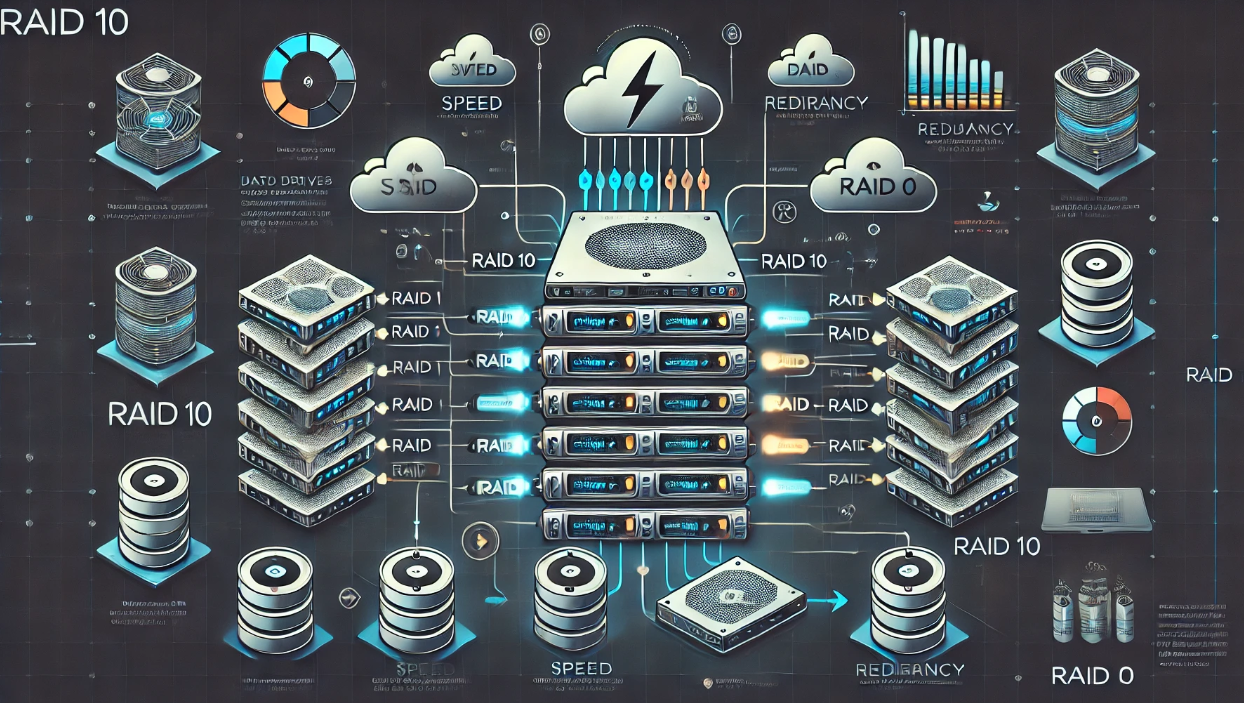The Role of RAID in VPS Hosting and Why It Matters
Meta Description: Discover how RAID enhances VPS hosting performance and protects your data. Learn the different RAID levels, their benefits, and why it matters for uptime, speed, and reliability.
Introduction: What’s RAID Got to Do with Your VPS?
When you’re evaluating VPS hosting, specs like CPU, RAM, and bandwidth usually grab your attention first. But there’s one often-overlooked feature that plays a huge role in data protection and performance: RAID.
Short for Redundant Array of Independent Disks, RAID is a technology that combines multiple physical drives into one logical unit — boosting speed, ensuring redundancy, or both.
In the world of VPS hosting, RAID isn’t just a technical checkbox — it’s a key player in protecting your data and keeping your site online, fast, and fail-safe.
️ What Is RAID in Simple Terms?
RAID is a way of arranging multiple hard drives to work together. Depending on the setup (called a “RAID level”), it can:
-
Speed up data reads/writes
-
Mirror data for redundancy
-
Or do both!
In VPS environments, RAID is implemented at the host node level — meaning the physical server that runs your VPS benefits from hardware-based drive redundancy and speed optimization.
The Most Common RAID Levels in VPS Hosting
✅ RAID 1 (Mirroring)
-
Writes data to two drives simultaneously
-
If one drive fails, the other has a full copy
-
Excellent for data protection
-
Drawback: No performance gain, doubles disk cost
✅ RAID 5 (Striping with Parity)
-
Distributes data and parity across three or more drives
-
Balances speed and redundancy
-
Can withstand one drive failure without data loss
-
Drawback: Slightly slower writes due to parity calculation
✅ RAID 10 (RAID 1 + RAID 0)
-
Combines mirroring and striping
-
Delivers high speed + redundancy
-
Requires at least four drives
-
Popular with high-performance VPS hosting
How RAID Enhances VPS Hosting
1. Data Redundancy = Peace of Mind
Hardware can fail — but with RAID, you’re covered. If a drive fails, your data is still accessible and can be recovered seamlessly.
In a non-RAID setup, drive failure could lead to:
-
Full data loss
-
Long recovery times
-
Unplanned downtime
With RAID, your VPS can continue operating without interruption in many cases.
2. Performance Boost with RAID Striping
RAID 0 and RAID 10 use striping to split data across drives, which:
-
Speeds up read/write operations
-
Reduces I/O bottlenecks
-
Makes your VPS feel faster during traffic spikes
Ideal for:
-
High-traffic websites
-
eCommerce stores
-
Apps requiring fast database access
3. Better Uptime and Reliability
RAID-backed servers offer better uptime because:
-
RAID helps avoid single-point storage failure
-
Most hosts use hot-swappable drives that can be replaced live
-
Prevents unexpected outages from disk failures
Some VPS providers combine RAID with automated backups, adding an extra layer of protection.
4. Cost-Efficient Protection
RAID is a low-cost insurance policy against hardware issues. Rather than relying on a single drive:
-
Your data is mirrored or distributed
-
Failed drives can be replaced without downtime
-
RAID arrays are monitored 24/7 by host providers
⚠️ But RAID Is Not a Backup
This is important:
RAID ≠ Backup.
While RAID protects against hardware failure, it doesn’t help if:
-
You accidentally delete files
-
A virus corrupts your data
-
You need to roll back to an earlier version
Always pair RAID with automated VPS backups for full protection.
️ How to Know If Your VPS Provider Uses RAID
When choosing a VPS hosting provider, look for mentions of:
-
RAID 10 SSD storage
-
RAID-protected hardware
-
High-availability architecture
-
NVMe RAID configurations (for ultra-fast I/O)
Many reputable providers advertise RAID features on their plans — because it matters.
VPS Hosting with RAID: Real-World Use Cases
eCommerce Business:
-
Site handles 5,000+ transactions per day
-
RAID 10 setup ensures no data loss or downtime during high traffic
-
Performance remains consistent even if a drive fails
SaaS Platform:
-
RAID 5 setup stores critical app data
-
Parity protection helps keep services running even if one drive fails
-
Combined with hourly backups for maximum safety
✅ Recap: Why RAID in VPS Hosting Matters
| Benefit | Description |
|---|---|
| Data Redundancy | Protects against hardware failures |
| Performance | Faster reads/writes with RAID 0 or 10 |
| Uptime | Keeps your VPS online even during disk issues |
| Reliability | Ensures long-term service continuity |
| Cost-Effective | Built-in with many VPS providers, saves downtime |
Final Thoughts: Invest in VPS with RAID for Resilience
Your VPS is more than just space on a server — it’s the foundation of your online business. And like any solid foundation, it needs built-in protection and speed.
RAID gives you exactly that.
So the next time you’re comparing VPS plans, look beyond RAM and CPU — and ask about RAID. Because when the unexpected happens, you’ll be glad your host planned ahead.

